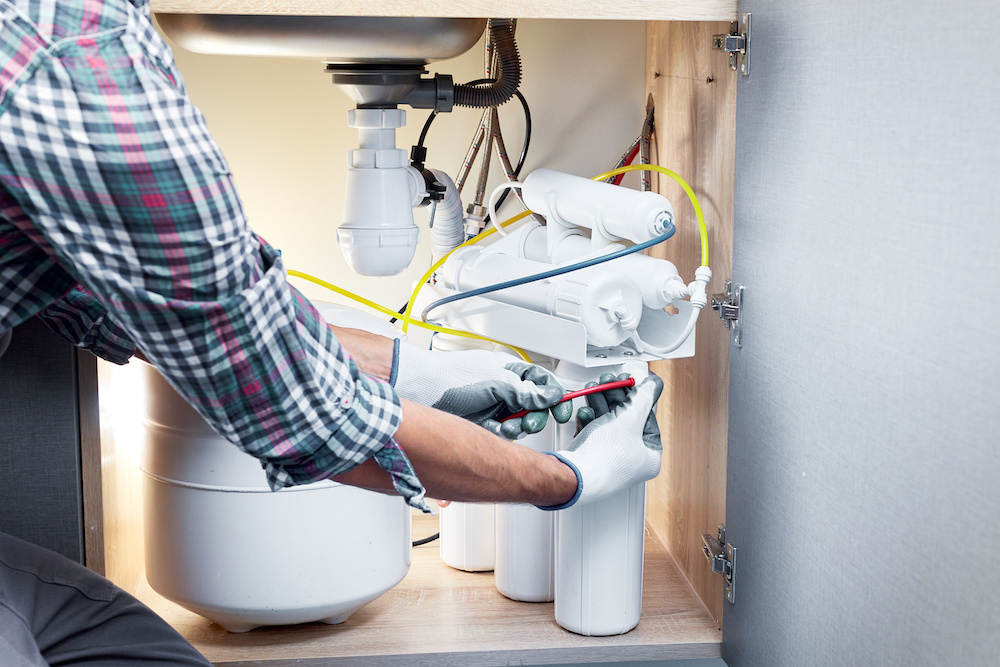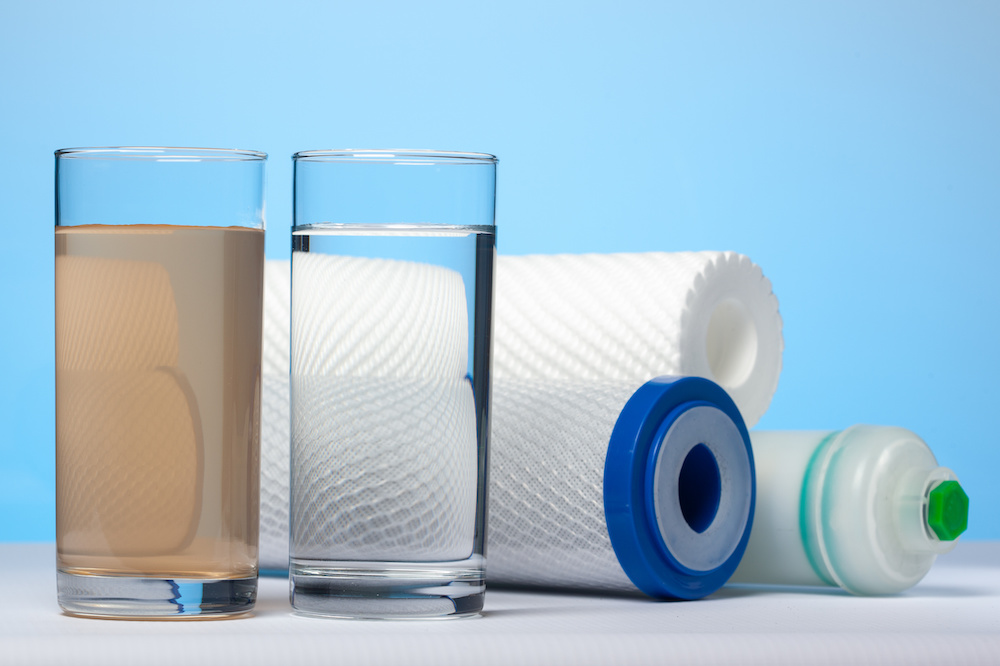Water is among the most crucial necessities we have as humans, so it’s not surprising that we want to improve its quality.
However, water issues such as hard water and bacterial contamination may have raised your concern regarding your family’s health
Thus, you may have asked yourself which is a better water-improvement solution: water softeners or water filters?
Worry no more because today, we’ll help you end the water softener vs water filter debate and choose which water treatment solution is right for you.
Water Softeners Explained
Water softeners are systems that remove calcium and magnesium minerals to soften water.
Hard water occurs when these minerals are present in higher concentrations, causing them to leave residue or clog water-using appliances, on glass surfaces, or on your skin.
Water softening systems do this through ion exchange in salt-based softeners, exchanging calcium and magnesium ions with sodium ions.
According to chemistry professor Chuck Wight, this ion exchange occurs when hard water touches sodium-positive resin beads in the water softener’s resin tank.
On the other hand, salt-free systems only work as water conditioners that crystallize calcium and magnesium using Template Assisted Crystallization (TAC).
Through TAC, minerals will no longer stick to your appliances or kitchenware but will still flow with your water.
To find out if installing a water softener system is for you, let’s check its pros and cons.
Pros
The benefits of having water softeners are as follows:
● Inhibits Hard Water Scale Build-Up
Calcium and magnesium buildup causes your water pipes to clog and kitchenware to stain.
Installing a water softener system helps inhibit hard water scale buildup by removing its cause from incoming water.
If you have hard water, your glassware may often look stained or cloudy after drying, no matter how much you clean them, what soaps or detergents you use, or how long you let the cleaning process last.
You’ll eliminate the minerals with a water softener before they can accumulate on your dishes.
Additionally, you’ll get more lather and cleaning action throughout your dishwashing routine because of the better fusion between soft water with soaps and detergents.
You might also be spending time cleaning the soap scum and lime from your shower walls, sinks, and faucets.
However, you can avoid these by using a water softener since soft water completely dissolves and penetrates soap.
● Lowers Home Maintenance and Repair Costs
While hard water poses no danger in itself, it can be costly to repair the damage it does over time.
Over time, mineral deposits can cause permanent plumbing damage. Often, this damage will require costly repairs by a professional plumber.
By softening your water before it has a chance to build up, you may effectively address the issue of hard water.
Moreover, a water softener can reduce utility bills by minimizing the pressure needed for water flow, and your water heater will work more efficiently.
Clogged pipes need more water pressure to deliver water, which means it uses more electricity.
Also, scale buildup inside your electronic appliances, such as dishwashers, washing machines, coffee makers, and water heaters, shortens their lifespans and lowers service quality and efficiency.
● Better Water for Hygiene
Installing a water softener also benefits your hygiene. Due to the mineral ions in hard water, it doesn’t wholly dissolve soaps, resulting in the formation of soap scum.
You’ll benefit from a deeper lather with a water softener since soft water lacks these minerals.
Aside from a deeper soap lather, softened water has advantages for the skin.
Your skin absorbs and retains moisture more readily because it lacks minerals that strip the skin’s natural oils, which can cause drying and, in some instances, irritated, itchy skin.
Softened water can also assist in balancing your hair’s pH level. This contrasts with hard water’s minerals which can cause your hair to become frizzy, dull, dry, and brittle.
Finally, no clogged shower pipes mean you enjoy more water and water pressure, allowing you to rinse soap and dirt better when bathing.
Cons
Some of the drawbacks you need to keep in mind when it comes to water softeners are as follows:
● Softened Water Can Be Unhealthy Under Certain Conditions
Converting hard water using salt-based water softeners means exchanging calcium and magnesium ions with sodium ions.
It means that the by-product will be salinated to some degree.
Although these trace amounts of salt are generally acceptable for consumption, this depends on how complex the treated water is.
Hard water with extremely high mineral content sometimes has a noticeable change in taste which can be off-putting to some.
Additionally, softened water is more likely to cause some types of plumbing to lose copper and lead.
Long-term ingestion can harm the liver and kidneys, while short-term exposure to lead and copper can cause nausea.
However, this isn’t an issue with modern plumbing.
● Soft Water Is Not Safe for the Environment
Since water from salt-based water softeners has more sodium than usual, studies suggest that it can pose environmental risks.
According to the Minnesota Department of Health, chloride in water threatens freshwater fish and other aquatic creatures. They also noted that there’s no simple way to desalinate water.
Salt amounts from different households also prove problematic as it only needs one teaspoon of salt to contaminate five gallons of water irreversibly.
For this reason, some US states and municipalities have imposed regulations and bans on salt-based water softeners.
This also depends on whether you are on a septic or sewer system.

Water Filters Explained
In most areas in the US, you can get drinking water from a municipally treated supply which is generally safe to drink.
Still, it frequently has an unpleasant taste and odor due to chemicals like chlorine used to disinfect the water.
Water filters are systems that improve the water’s quality by removing harmful contaminants such as sediments, minerals, and bacteria through a chemical, physical, or biological process.
Reverse osmosis is one of the most common house water filtration systems. It removes impurities from drinking water by using a semi-permeable membrane to trap significant pollutants and contaminants, including chlorine, salt, and grime.
A reverse osmosis system removes heavy metals, germs, pollutants, and sediments, purifying water to the molecular level and leaving filtered water up to 99% pure.
On the other hand, mechanical water filters physically remove debris, sediment, or other particles from the water.
Mechanical filters are assigned a micron rating, which describes how well the filter can remove particles of different sizes.
Standard ratings include:
● Five Microns: Filters most visible particles
● One Micron: Filters particles that need a microscope to be seen
● 0.5 Micron: Removes pathogens such as Giardia and Cryptosporidium
You can also look at adsorption water filters which use activated carbon to attract and trap dissolved solids and specific contaminants.
These are usually better used in point-of-use systems such as faucets, countertops, and under the sink since it uses cartridges that require frequent changing.
To know if installing a home water filtration system is for you, let’s examine its pros and cons.
Pros
Here are the advantages of using water filters:
● Gives You Better Water Quality
Unfiltered water, even if you don’t see any contaminants, may still contain impurities that can cause water problems.
Even if your municipality treats your water well, leaky water pipes can still introduce bacteria, chemicals, and debris to your pipeline.
Installing a water filter gives you an additional line of defense from these impurities with little cost, depending on your chosen filtration system and its NSF ratings.
You can also ease your concern about the safety of your family’s drinking water.
● Easy to Maintain
Most modern point-of-use and whole-house water filters are easily maintained.
Typically, they have replaceable filter cartridges or membranes that you have to change depending on how much water you’re using and how much hard minerals are present.
Reverse osmosis systems usually need their membranes changed every three to five years, while point-of-use filters need their cartridges replaced every six to 12 months.
● Some Options Are Affordable and Easily Installed
While a house water filtration system can be costly to install, there are also affordable and effective water filter options.
A 2017 study found that point-of-use filters, such as faucet attachments and under-the-sink units, are highly effective in mitigating diseases brought by water contamination.
Carbon water filters for faucets usually cost around $50 to $500, while point-of-use under-the-sink units typically cost $150 to $900.
They are a worthy investment if you consider the medical costs of drinking contaminated water.
Cons
With all the benefits you get from water filters, here are some of the disadvantages to consider:
● Requires Regular Maintenance
Although water filters are relatively easy to maintain, they require regular maintenance and cleaning to function well.
The costs of cartridges and membranes can also add up over time, so reusable water filter systems might not be ideal for you if you’re looking for a long-term investment.
● Some Water Filters Don’t Remove Heavy Metals
Aside from activated carbon filters, reverse osmosis, electrodialysis, and ultrafiltration systems, no water filtration system can remove heavy metals, such as calcium and magnesium, as water softeners do.
Also, note that only a whole home water softener system can stop heavy metal deposits from clogging your pipes.
A wise step to test your water and check your pipe work to determine the ideal setup for you. You may also check out our other articles posted for other possible alternatives beyond water softeners and water filters.
Water Softener vs Water Filter: Choosing the Right One
Do you want to make your water safer to drink? Use a water filter.
Do you need to remove hardness or minerals from your water? A water softener’s for you.
However, if you want both and have the budget, you can have both.A water softener to have softer water throughout your home and a reverse osmosis system to have purified drinking water at your sink.

